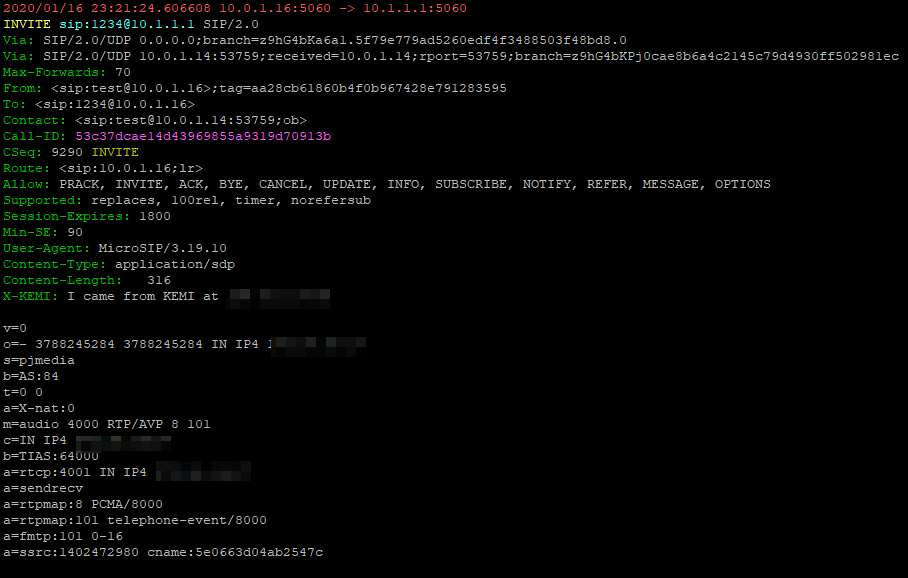In my last post I talked about using KEMI in Kamailio and how you can integrate in a different programming language to handle your SIP request handling in a language you already know – Like Python!
So in this post I’ll cover the basics of how we can manage requests and responses from Kamailio in Python, if you haven’t already read it, go back to last weeks post and get that running, it’s where we’ll start off.
The Framework
Before we get too excited there’s some boilerplate we’ve got to add to our Python script, we need to create a class called kamailio and populate the class by defining some functions, we’ll define an __init__ to handle loading of the class, define a child_init for handling child processes, define ksr_request_route to handle the initial requests. We’ll also need to define a mod_init – outside of the Kamailio class to initialize the class.
import sys
import Router.Logger as Logger
import KSR as KSR
import requests
# global function to instantiate a kamailio class object
# -- executed when kamailio app_python module is initialized
def mod_init():
KSR.info("===== from Python mod init\n");
return kamailio();
# -- {start defining kamailio class}
class kamailio:
def __init__(self):
KSR.info('===== kamailio.__init__\n');
# executed when kamailio child processes are initialized
def child_init(self, rank):
KSR.info('===== kamailio.child_init(%d)\n' % rank);
return 0;
# SIP request routing
# -- equivalent of request_route{}
def ksr_request_route(self, msg):
KSR.info("===== request - from kamailio python script\n");
KSR.dbg("method " + KSR.pv.get("$rm") + " r-uri " + KSR.pv.get("$ru"))
Most of these should be pretty self explanatory for anyone who’s done a bit more in-depth Python programming, but it’s no big deal if you don’t understand all this, the only part you need to understand is the ksr_request_route function.
ksr_request_route: translates to our request_route{} in the Kamailio native scripting language, all requests that come in will start off in this part.
Python Kamailio Routing
So let’s start to build upon this, so we’ll blindly accept all SIP registrations;
...
# SIP request routing
# -- equivalent of request_route{}
def ksr_request_route(self, msg):
KSR.info("===== request - from kamailio python script\n");
KSR.dbg("method " + KSR.pv.get("$rm") + " r-uri " + KSR.pv.get("$ru"))
if KSR.is_method("REGISTER"):
KSR.sl.send_reply(200, "Sure")
Here you’ll see we’ve added an if statement, as if we were doing any other If statement in Python, in this case we’re asking if the KSR.is_method(“REGISTER”), and if it is, we’ll send back a 200 OK response.
Let’s pause and talk about KSR
All the Kamailio bits we’ll use in Python will have the KSR. prefix, so let’s take a quick break here to talk about KSR. The KSR. functions are the KEMI functions we’ve exposed to Python.
Without them, we’re just writing Python, and we’d have to do all the functions provided by Kamailio nativeley in Python, which would be crazy.
So we leverage the Kamailio modules you know and love from Python using Python’s logic / programming syntax, as well as opening up the ability to pull in other libraries from Python.
There’s a full (ish) list of the KEMI functions here, but let’s talk about the basics.
Let’s look at how we might send a stateless reply,
There’s a module function to send a stateless reply;
KSR.sl.send_reply(200, "OK")The vast majority of functions are abstracted as module functions, like the example above, but not all of them.
So every function doesn’t need to be wrapped up as a module, there’s also a way to call any function that you’d call from the native scripting language, wrapped up, kind of like an Exec command:
KSR.x.modf("sl_send_reply", "200", "OK");So thanks to this we can call any Kamailio function from Python, even if it’s not explicitly in the KEMI abstraction.
Python Kamailio Routing (Continued)
So earlier we managed REGISTER requests and sent back a 200 OK response.
What about forwarding a SIP Request to another proxy? Let’s follow on with an elif statement to test if the method is an INVITE and statelessly forward it.
elif KSR.is_method("INVITE"):
#Lookup our public IP address
try:
ip = requests.get('https://api.ipify.org').text
except:
ip = "Failed to resolve"
#Add that as a header
KSR.hdr.append("X-KEMI: I came from KEMI at " + str(ip) + "\r\n");
#Set host IP to 10.1.1.1
KSR.sethost("10.1.1.1");
#Forward the request on
KSR.forward()
Now an incoming SIP invite will be proxied / forwarded to 10.1.1.1, all from Python.

But so far we’ve only done things in KEMI / Python that we could do in our native Kamailio scripting language, so let’s use some Python in our Python!
I utterly love the Python Requests library, so let’s use that to look up our public IP address and add it as a header to our forwarded SIP INVITE;
elif KSR.is_method("INVITE"):
#Lookup our public IP address
try:
ip = requests.get('https://api.ipify.org').text
except:
ip = "Failed to resolve"
#Add that as a header
KSR.hdr.append("X-KEMI: I came from KEMI at " + str(ip) + "\r\n");
#Set host IP to 10.1.1.1
KSR.sethost("10.1.1.1");
#Forward the request on
KSR.forward()
(For anyone pedantic out there, Kamailio does have an HTTP client module that could do this too, but Requests is awesome)
So let’s have a look at our forwarded request:

So let’s wrap this up a bit and handle any other request that’s not an INVITE or a REGISTER, with a 500 error code.
# SIP request routing
# -- equivalent of request_route{}
def ksr_request_route(self, msg):
KSR.dbg("method " + KSR.pv.get("$rm") + " r-uri " + KSR.pv.get("$ru"))
if KSR.is_method("REGISTER"):
KSR.sl.send_reply(200, "OK")
elif KSR.is_method("INVITE"):
#Lookup our public IP address
try:
ip = requests.get('https://api.ipify.org').text
except:
ip = "Failed to resolve"
#Add that as a header
KSR.hdr.append("X-KEMI: I came from KEMI at " + str(ip) + "\r\n");
#Set host IP to 10.1.1.1
KSR.sethost("10.1.1.1");
#Forward the request on
KSR.forward()
else:
KSR.sl.send_reply(500, "Got no idea...")

Good day!
But how to connect the library itself to queries?
I installed it to the base interpreter via pip but kamailio does not see it
You need to install app_python3 module from apt or compile Kamailio with it. https://www.kamailio.org/w/2018/03/new-module-app_python3/
Hi Roman, I had the same issue with kamailio not being able to see the installed library. For me, I installed the library with my normal user, that is why the module was installed in /home/$user/.local/lib/python3.x/site-packages. Kamailio could not read this module from the python even after i tried to append the path of the module in my python script –> sys.path.append(“/home/$user/.local/lib/python3.x/site-packages/”).
So as a last resort, I installed the library using sudo. sudo pip install x. This did the trick me.